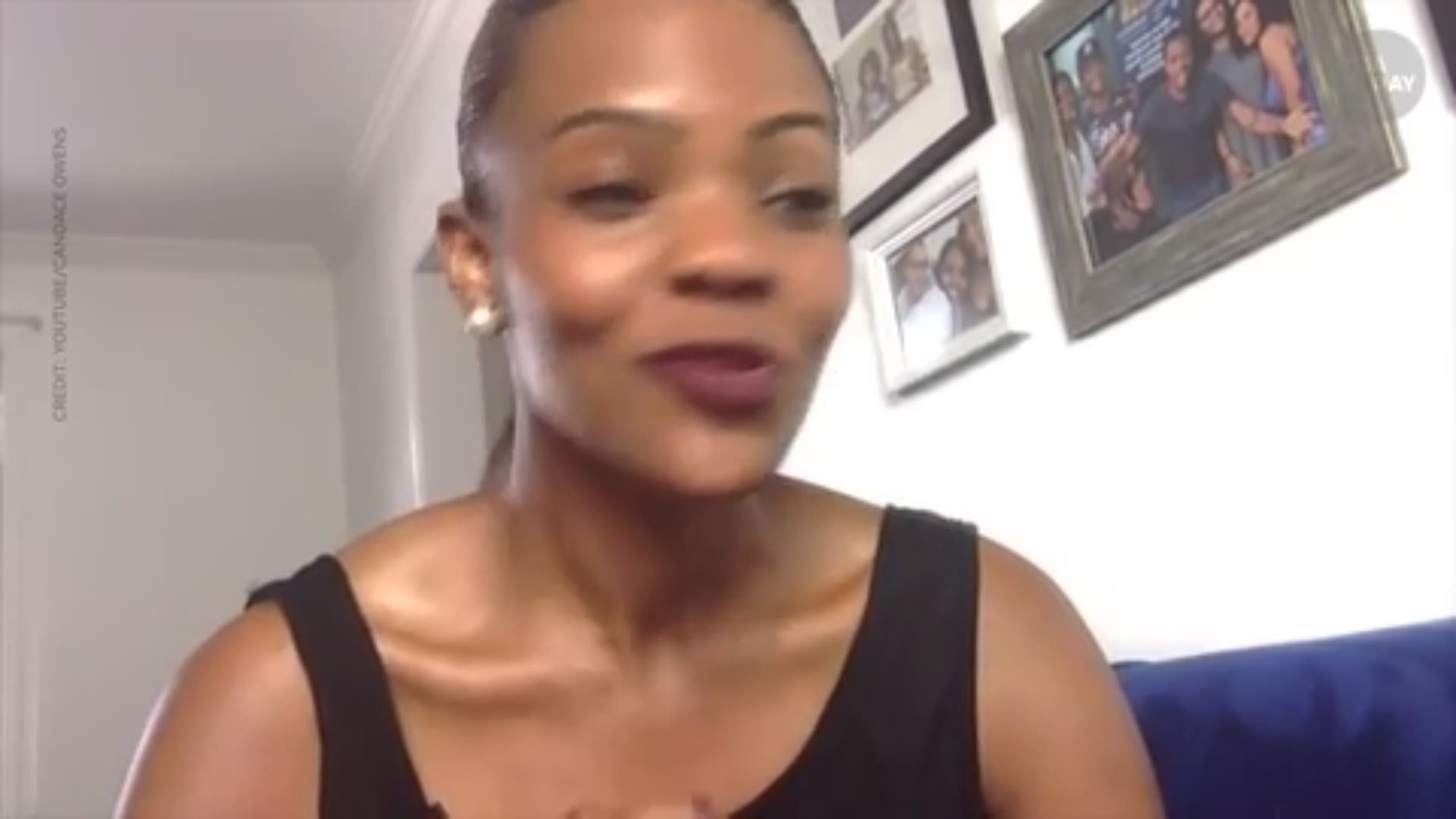It’s a Wednesday morning at Liberty University and the basketball arena is packed with nearly 10,000 people. Students reach their arms skyward, eyes closed, entranced in deafening Christian rock music.
Backstage, administrators and students dote on Candace Owens, that day’s convocation speaker, who has quickly built a career trashing liberal politics with a millennial fierceness. She hasn’t rehearsed. It protects her authenticity. But she knows her beats.
Onstage, she speaks for about 24 minutes, calmly gliding back and forth across the stage in heels, attacking some of her usual targets: Planned Parenthood, feminism, the welfare system.
She builds to the moment. Then, she goes for it.
“Kanye West. Man, he’s a wonderful man,” she says to applause and cheering — breaking the quiet of what had become a calm, attentive audience.
“What is it that President Donald Trump, Kanye West and Candace Owens have in common?” she asks rhetorically. “Kanye West describes it as 'dragon energy' and to me I think it’s individualism. It’s believing in yourself. It’s standing up in the face of everybody telling you you can’t.”
Owens embraces her role as the young black woman defending conservatism, attacking liberals and praising two of America's more complicated men.
Since April when West tweeted, "I love the way Candace Owens thinks," she has never been far behind the star, playing his chief defender as he lurched from one controversial headline to the next. She accompanied West to TMZ when he said slavery "sounds like a choice" and posted a photo of herself with West after his headline-making White House visit last week. People ask her to autograph West's CDs.
Owens, 29, regularly appears on Fox News and travels six days a week to speak at college campuses. It's made her friendly with Trump and the first family, some of whom she's met for dinner.
But barely more than a year ago she was an unknown YouTuber.
What changed her life was a video about the Charlottesville rally, wherein she blames the media for creating racial hysteria. That video prompted Fox News host Jesse Watters to invite her on the network for the first time late last year.
Fox News amplified Owens, who was then hired by Turning Point USA, an organization aimed at bringing conservative ideas to college campuses. Her Twitter following quickly grew to 108,000. West's tweet brought hundreds of thousands more, ballooning her audience to 850,000 today.
The president also took notice. Trump said Owens "represents an ever expanding group of very smart 'thinkers.'"
Her rapid rise gives her a massive political voice for someone with such a brief career — or even interest — in politics. Owens says she has never voted. Not for Trump, or any other candidate, and only recently registered as a Republican, but previously identified as liberal.
"I had no interest in politics whatsoever prior to 2015," she said.
Owens illustrates a political fact stamped and sealed by Trump: that strong voices can break through regardless of prior experience.
Owens defends Trump's comments after Charlottesville: "I still agree with him. There are morons on both sides." She doesn’t believe in white privilege and often criticizes Black Lives Matter. Feminism, she claims, has become radicalized. Planned Parenthood is "murdering" people using abortion, which has slowed black population growth. The media causes dissent. And lately, amid Kavanaugh's ascension to the Supreme Court: "I'm really passionate about defending men."
She's now preached politics to hundreds of thousands of students, said Turning Point founder Charlie Kirk. Her reach isn't contained to conservative havens like Liberty, where its president Jerry Falwell Jr. is an outspoken Trump supporter. Most recently Owens and Kirk spoke at the University of Colorado-Boulder, the University of Washington and the University of Georgia.
After the speech at Liberty, Owens jumped off stage and was hounded by a group of students, black and white, seeking selfies. Security had to step in to control the crowd. On Twitter, the speech was mostly praised.
But outside the arena at a small protest, Liberty senior Abigail Ferris held up a pro-#MeToo sign. It's the day before Christine Blasey Ford, who accused Supreme Court Justice Brett Kavanaugh of sexual assault, testified before a Senate committee. Owens often dismisses the #MeToo movement as a Democratic political ploy and called Ford a liar who should serve time in prison.
"We're not directly protesting her," Ferris said. "But we are showing while she has made some disparaging remarks to the movement, that there are students on campus who respectfully disagree with her."

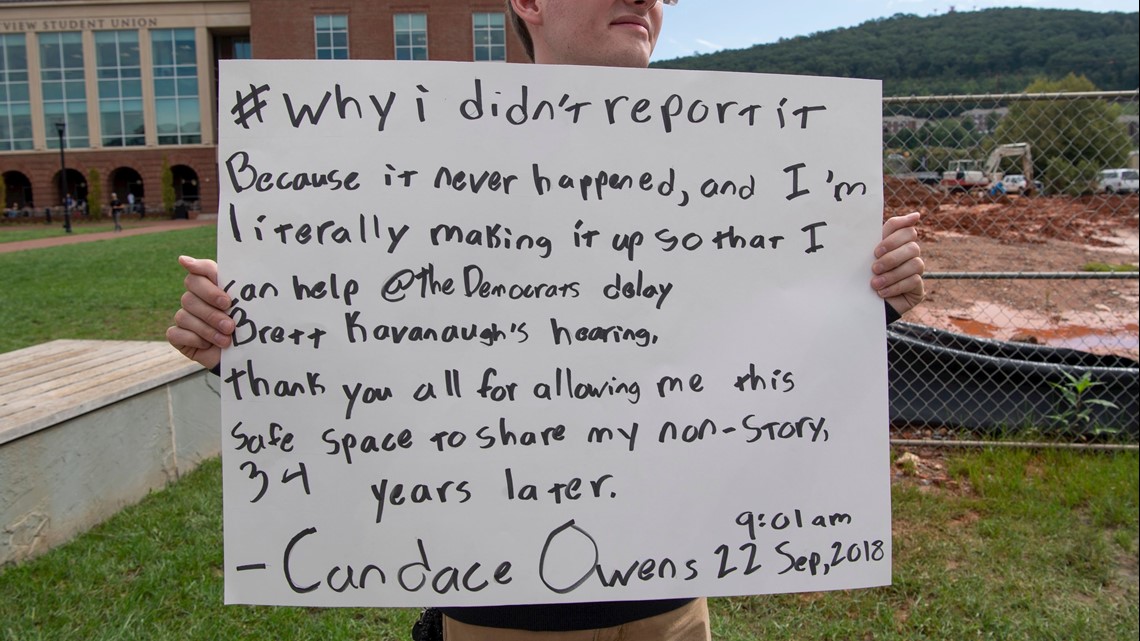
More than anything, Owens preaches against victimhood, particularly among African Americans, a pull-yourself-up-by-your bootstraps mindset.
“I consider myself insanely privileged to be in this country," she said. "I try to tell people how much value there is in seeing yourself as privileged ... because if you see yourself as a victim, you’ll have that shade over your eyes in life and you’re not going to accomplish much."
She bolsters her message with an intriguing personal story, one that starts in poverty, involves a traumatic episode of racism and an I've-seen-the-dark-side political awakening. She sees it as the perfect antidote to liberal attacks on Republicans over race.
A 'victim' who hates the word
Owens grew up in Stamford, Conn., the middle child of three girls. Her father was a property manager and her mother an executive assistant. Even as a toddler, Owens didn't back down in a debate, her dad Robert Owens Jr., said.
The family grew up in poverty, she claims, living in a small apartment before moving into the home of her grandfather, who laid tobacco out to dry on a sharecropping farm at age 5 and faced the Ku Klux Klan.
"He is a man's man," Owens said. "That masculinity is now being taught as toxic, when in reality it's the one thing that grounded me as a child."
In 2007, Owens' senior year at Stamford High School, came an experience that shaped her personally — and eventually politically.
Four boys called her from a blocked number and left voicemails with racial epithets and threats of violence.
“They were calling me the N-word, they were saying they were going to put a bullet into the back of my head as they had done to Martin Luther King. They were calling me Rosa Parks. They were telling me that they were going to tar and feather my family,” she told the Liberty crowd.
The episode became enflamed because one of the boys was the son of then-Stamford mayor Dannel Malloy, the current Democratic governor of Connecticut. Owens, then 17, faced threats and harassment in school for weeks afterward, according to a lawsuit her father filed against the Stamford Board of Education. Robert Owens, in his filing, said the school district failed to protect his daughter from the harassment. The school board later settled with the family for $37,500, according to a settlement agreement provided by the board.
The Stamford Police Department said documents related to the case were sealed because those involved were minors and a spokesman would not confirm the outcome. But the Danbury News Times reported police arrested at least one student.
Owens was out of school for weeks because of the incident, which drew the attention of the NAACP, which defended her in the media. But Owens felt like a public relations pawn.
"I would come out of school and they would be outside with cameras and speaking, and I would stand there," she said. "It was really awful because then it sort of gave people that fire of like, 'she's doing this for attention.'"
The incident, Owens said, set in motion years of anorexia, which lasted through college and into her working years.
"It was really just a manifestation of trying to control something in your life," she said.

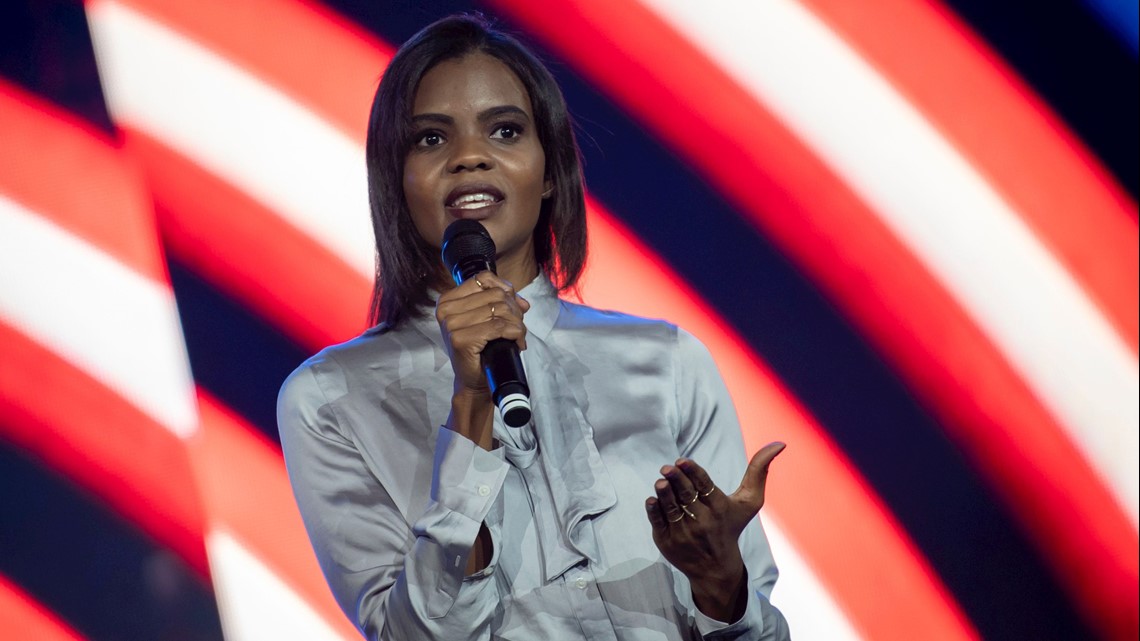
Today, she complains about the media framing her as the victim.
"What it taught me was how little value there was in victimhood," she said. "Now, according to the left, that should have been the best moment of my life."
In 2016, she wrote an op-ed in the Stamford Advocate defending the boys, which hints at what has become her candid speaking style.
"I'll be the first to say I am sorry," she wrote, "To all of them, having to endure that experience; a group of children dissected and labeled."
Years later, Owens chalks up the voicemails to poor decision-making, not racism.
"They were labeled these racists, and I never felt that they were racists," she said. "I felt that they were people who did something that was really stupid."
She said some of the boys have since thanked her.
"People should be allowed to evolve," she said.
Doxxing and media distrust
After high school, Owens enrolled at the University of Rhode Island to study journalism, but dropped out in 2010 because she said her loan was declined. She then moved to New York City, and found steady work at a private equity firm, where she worked for four and a half years, starting off as an assistant and working her way up to the vice president of administration.
In 2014, she started the website Degree 180, a now-defunct lifestyle blog.
"I wanted to find my voice," she said.
The website sometimes touched on politics — one contributor wrote the idea of a Trump presidency "makes my skin crawl." But Owens, listed as the founder and CEO, wrote mostly about relationships and sometimes sex. She did say in October 2015 that she welcomed the end of the Republican Tea Party movement and their "crazy antics."
In April 2016 Owens started fundraising for another venture, an anti-cyberbullying website named Social Autopsy — the rapid downfall of which would embolden her political views and distrust of the media.
Social Autopsy aimed to connect people's social media comments to their places of employment as a way to hold people accountable. But to targets of GamerGate, an online harassment campaign led by video gamers, it sounded like "doxxing," the term for exposing someone's personal information online. Owens denies this was the intent.
When Social Autopsy launched a $75,000 Kickstarter campaign, it drew criticism in blogs and a lengthy piece in New York Magazine. Kickstarter suspended the project after two days, arguing the "project's plan to 'dox' people were in violation of our rules."
Social Autopsy's coverage in the media made Owens a conservative overnight, she told Dave Rubin on his YouTube show "The Rubin Report" last year. To USA TODAY, she describes her political switch as the result of a perfect storm driven by an intense distaste for the media and Trump's rise.
"There's this guy who I used to watch on reality TV who's running for president of the United States and he says they're fake news," she said. "It was happening to me at the same time."

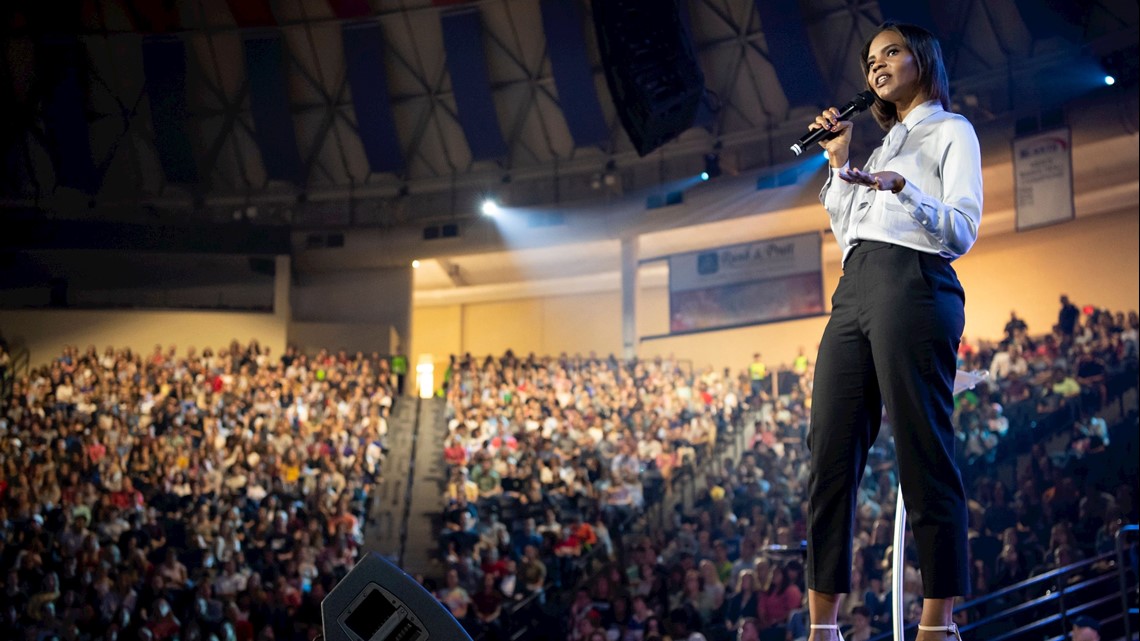
The incident drew her to conservative outlets she'd formerly cast off as fringe, like Breitbart.com.
She also started exploring the writings of black conservatives, such as Thomas Sowell, a senior fellow at Stanford University'sHoover Institution. Like Owens, Sowell has alleged liberal attempts to stifle free speech on college campuses. He slammed the "liberal media" in a column for the conservative National Review in late 2016 regarding Trump's picks for top White House positions.
"They would be worried about anyone who has not been brainwashed in the political correctness that reigns among the intelligentsia," he wrote.
Out of her self-immersion in right-wing media and black conservatism came a new outlook, which Owens describes like a calling.
"I want to make a difference," she said. "I want people to know my story so that they know that it can be their story, that they’re in control of their own destiny."
To do that, she'd use a 21st Century technique to push the ideas of Sowell and others to a social media crowd.
"I said, ‘How can I bring that message that they’re saying so brilliantly to a wider audience?" she said. "'Oh, I’m like a Millennial. I can do a YouTube channel. I’m hilarious.'"
YouTube to Fox to Kanye
Owens began making a series of YouTube videos in July 2017. Her first post features her "coming out" as a conservative to her parents, who are aghast at the news. All characters are played by Owens. In her most watched video, with 1.6 million views, she mocks a list of demands Black Lives Matter made of white people.
The videos kickstarted a new career as a conservative commentator, earning her airtime on Fox and, eventually, West's attention. When he tweeted about her in April, she reacted like a fan, not the collaborator she is now.
"Please take a meeting with me," she tweeted to West just minutes later. "I tell every single person that everything that I have been inspired to do, was written in your music."
Days later she appeared with West on TMZ, when he made his remarks about slavery. West drew widespread condemnation for his comments — including from other celebrities, like Stevie Wonder and Kobe Bryant — and later apologized.
But former secretary of state Condoleezza Rice, another black Republican, defended him.
“People ought to be able to express their views,” she said. “Not all of us have to think politically the same way. I’ve said to people sometimes, ‘You know, I’ve been black all my life. You don’t have to tell me how to be black.’”
Not long after TMZ, Owens visited Trump at the White House.
Owens doesn't think she's treated differently in conservative media because of her race, but does suggest there is a "sense of relief" with her in the fold.
"I think there's a draw. I think there's a validation," Owens said. "Imagine being a Republican and for years and years you try to say something and you get called a racist."
But Tasha Philpot, a professor of government at the University of Texas at Austin, said Owens and West draw more attention because they're unique.
"They’re novel and so they can get media attention and coverage in ways that black Democrats can’t," Philpot said. "The idea that there is this special person, this aberration, exception to the rule, does certainly get you a platform that you wouldn’t have otherwise."
An exception because Trump's approval rating among African Americans lags at 10 percent, according to a most-recent Gallup poll. Just 8 percent of African Americans voted for Trump in 2016, which is slightly higher than Republican presidential contenders John McCain and Mitt Romney when they took on former president Barack Obama in 2008 and 2012; but slightly lower than former Republican president George W. Bush's outcomes with African Americans in 2000 and 2004, according to Cornell University's Roper Center for Public Opinion Research.
"There’s nothing particularly appealing, especially in this highly racialized political environment that would draw blacks over to the Republican party,” Philpot said.
Trump often touts black unemployment, which has reached lows. Although, as the Associated Press has reported, economists have argued the success is not Trump's doing but the result of years of economic recovery started years ago. The White House also distributed false statistics saying Trump has created more jobs for African Americans than Obama, something for which the White House later apologized.
"At this point, wearing a MAGA hat is a proxy for not being authentically black," Philpot said.
Owens has her share of black critics. Black Lives Matter protesters have heckled her speeches. The news website The Root, which focuses on African American issues, often takes aim at her.
"Either they are delusional or they earned their Ph.D.s from the history, sociology and political science departments at the University of the Sunken Place," wrote Michael Harriot in The Root, referring to Owens and West while referencing the hypnotic abyss from the film Get Out.
It's the comments from other African Americans that bother her father, Robert Owens.
"What really makes me upset are the comments she gets from her own race," said Owens, a registered Independent who did not vote for Trump or Hillary Clinton in 2016.
"We as African Americans need to stop believing that we can only vote Democrat," said Owens, whose daughter predicted a black exodus from the Democratic party on Fox News. "We need to stop using slurs against those that choose to vote Republican because, in my opinion, there are good people on both sides."
Philpot says black Republicans are different from black conservatives. Many African Americans identify as conservatives, which she ties to the importance of religion in black community. But, she says, not all of those black conservatives vote Republican.
“Usually [black Republicans] tend to have lower levels of group consciousness," Philpot said. "They define their conservatism not just in terms of being anti-government or reduced social spending but also in terms of blacks not relying on the government to get ahead.”
Owens insists she's not trying to convince people to become Republicans, but rather show them not to "blindly" trust in the media. She also comes out swinging against white progressives.
“Black people have become for white liberals like the puppy that they rescued from the pound,” she said. “White people that want to scream so much on behalf of black people that you can’t even hear what black people have to say. If a black conservative says, ‘No, thank you,’ they lose their minds because they’ve built their sense of worth on being the righteous white person.”
Changing minds
Owens' abrupt shift from liberal to conservative confounds some. Her critics often point to some anti-Trump posts on Degree180 to counter what she says on television.
“You wonder why did she flip her perspective," said Nikki Usher, a professor of media at the University of Illinois Urbana-Champagne. "Is it because she is somebody who genuinely has re-thought her ideological commitments or is this like a really good way to feed your ego and put yourself out there and establish a career?"
Usher suggests that a number of conservative pundits — Diamond and Silk, the black conservative duo popular on Facebook, as well as InfoWars' Alex Jones and the website's editor Paul Joseph Watson, whom Owens calls an "amazing friend and a true supporter" of hers — have found their way into the mainstream in a way "that didn't really exist before the internet."
Now people pay attention when someone is "taking very alternative positions that then gain attraction in the digital space and then cannot be ignored by sort of the more mainstream right-leaning sites," Usher said.
Owens bats down suggestions she has ulterior motives.
"It's just something that I believe in, and I love what I do," she said.

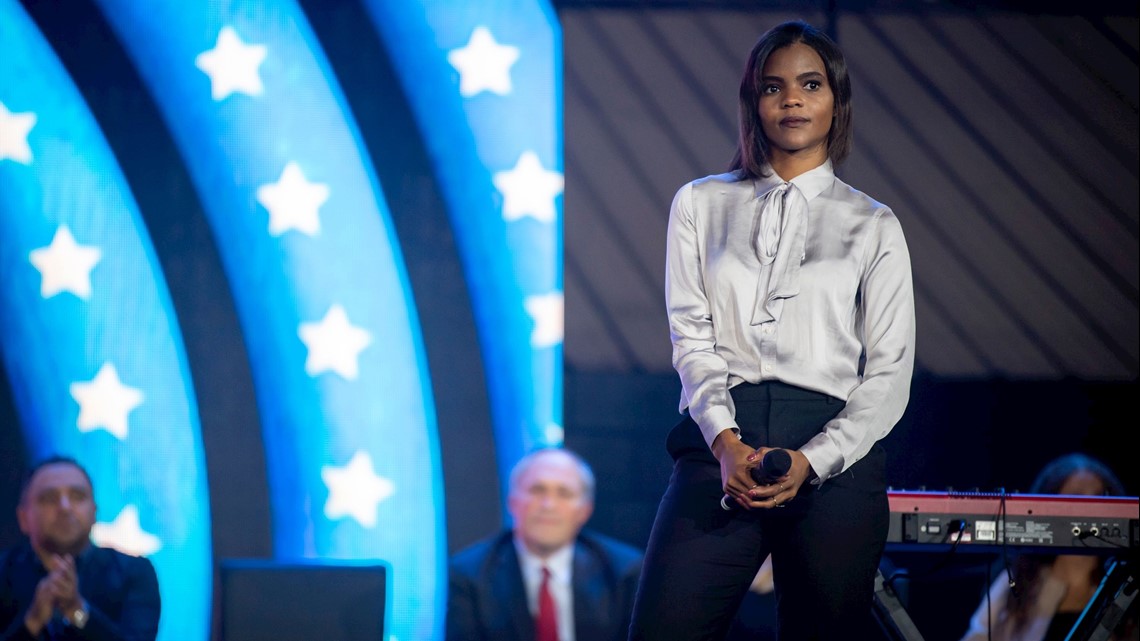
Owens' story of political conversion is part of her pitch. Such stories have appealed to people for generations and been used by famous leaders like Ronald Reagan, Hillary Clinton and Malcolm X, said Don Waisanen an associate professor of communication at Baruch College-CUNY who wrote a book about political conversions.
"This is one of the most convincing arguments you can make in politics," he said.
Waisanen said most conversions go from liberal to conservative. He argues it resonates better with a crowd accustomed to religious redemption narratives.
"It’s a way of kind of arguing in a religious way without the overt religious overtones that you are going from one paradigm to the other,” he said. “That form of ‘I once was lost but now am found, was blind but now I see,’ it’s still maintained in these narratives.”
Whatever the draw, Owens now boasts a bigger profile than her boss.
"No one in the modern era of American politics has accomplished such a meteoric rise in the cultural and political world," said Kirk, the Turning Point founder. "Commentating on the news and doing punditry is a very small piece of Candace Owens. She is a movement leader."
For now, Owens won't pinpoint a future. She's planning to launch a podcast that touches on culture and politics, but says "there's no destiny."
She doesn't plan on running for public office as long as she's satisfied with the country's leadership.
"If I wanted to be the president, I would win," she said "I hope we don't need Candace for president. I hope it just is that America keeps on this trajectory and just that these social battles can die down. They're a little insane."

